I always thought that I had one thing in common with Michael Portillo,
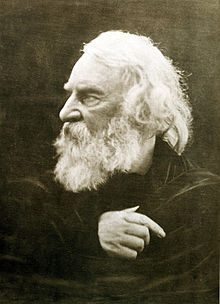
Henry Wadsworth Longfellow photographed by Julia Margaret Cameron in 1868
but found out the other day we actually shared two. We both share a love of trains and train travel and we also had Henry Wadsworth Longfellow’s poem, The Song of Hiawatha drummed into us when we were at school. I rather liked Longfellow’s epic poem. I admired its clever use of meter (Trochaic tetrameter I am told). Simplified this really means the following: DUM da DUM da DUM da DUM da. Although to be truthful, this did not mean much to me at the time. Mr Wight (our form master), was passionate about Native Americans and it was during those few short lessons that I learnt a lot about the poem and to some extent, the European attitude towards the indigenous races of North America.
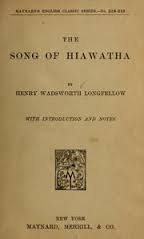 Although I was fond of Red Indian’s (as they were referred to during my school days), I still deep down thought that they were the bad guys who attacked the poor white settlers until they were punished by the US Cavalry. Like most children who could not see beyond the end of their nose, I had been indoctrinated by the countless films I had seen. The Revisionist Westerns of the late 1960s and early 1970s had not really been shown so the attitude towards the Native Americans in most movies was pretty standard with one or two notable exceptions.
Although I was fond of Red Indian’s (as they were referred to during my school days), I still deep down thought that they were the bad guys who attacked the poor white settlers until they were punished by the US Cavalry. Like most children who could not see beyond the end of their nose, I had been indoctrinated by the countless films I had seen. The Revisionist Westerns of the late 1960s and early 1970s had not really been shown so the attitude towards the Native Americans in most movies was pretty standard with one or two notable exceptions.
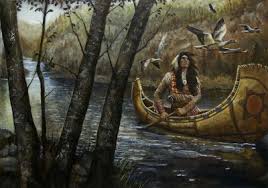 What, may you ask has this to do with the antiques trade? Well not too much, but Longfellow’s poetry (including The Song of Hiawatha) can be easily found. I see books of his poetry all the time and because of their availability, they are very cheap. Today to some extent, we sneer at epic poems such as The Song of Hiawatha. They can be quite hard to read and were written when tastes in poetry were quite different. Tennyson has not aged well and a number of his contemporaries are rarely read.
What, may you ask has this to do with the antiques trade? Well not too much, but Longfellow’s poetry (including The Song of Hiawatha) can be easily found. I see books of his poetry all the time and because of their availability, they are very cheap. Today to some extent, we sneer at epic poems such as The Song of Hiawatha. They can be quite hard to read and were written when tastes in poetry were quite different. Tennyson has not aged well and a number of his contemporaries are rarely read.
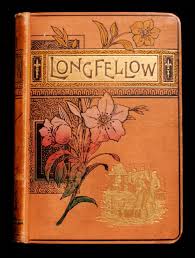 Today, we like bite sized poems. We do not do epic poems any more. But if you are wandering around the Arcade or an antiques shop and see a copy of Longfellow’s Hiawatha or a book of his poetry, do pick it up. There is no need to read The Song of Hiawatha in one go. Just give it time as it is a masterful poem. The wider understanding of this poem certainly changed my attitude towards the Native Americans.
Today, we like bite sized poems. We do not do epic poems any more. But if you are wandering around the Arcade or an antiques shop and see a copy of Longfellow’s Hiawatha or a book of his poetry, do pick it up. There is no need to read The Song of Hiawatha in one go. Just give it time as it is a masterful poem. The wider understanding of this poem certainly changed my attitude towards the Native Americans.
https://creativecommons.org/licenses/by-sa/3.0/
Book I: The Peace-Pipe
On the Mountains and the Prairie,
On the great Red Pipe-stone Quarry,
Gitche Manito, the mighty,
He the Master of Life, descending,
On the red crags of the quarry
Stood erect, and called the nations,
Called the tribes of men together.
From his footprints flowed a river,
Leaped into the light of morning,
O’er the precipice plunging downward
Gleamed like Ishkoodah, the comet.
And the Spirit, stooping earthward
With his finger on the meadow
Traced a winding pathway for it,
Saying to it, ‘Run in this way!’
From the red stone of the quarry
With his hand he broke a fragment,
Moulded it into a pipe-head,
Shaped and fashioned it with figures;
From the margin of the river
Took a long reed for a pipe-stem,
With its dark green leaves upon it;
Filled with the bark of the red willow;
Breathed upon the neighboring forest,
Made its great boughs chafe together,
Till in flame they burst and kindled;
And erect upon the mountains,
Gitche Manito, the mighty,
Smoked the calumet, the Peace-Pipe,
As a signal to the nations.
And the smoke rose slowly, slowly,
Through the tranquil air of morning,
First a single line of darkness,
Then a denser, bluer vapor,
Then a snow-white cloud unfolding,
Like the tree-tops of the forest,
Ever rising, rising, rising,
Till it touched the top of heaven,
Till it broke against the heaven,
And rolled outward all around it.
From the Vale of Tawasentha,
From the Valley of Wyoming,
From the groves of Tuscaloosa,
From the far-off Rocky Mountains,
From the Northern lakes and rivers
All the tribes beheld the signal,
Saw the distant smoke ascending,
The Pukwana of the Peace-Pipe.
And the Prophets of the nations
Said: ‘Behold it, the Pukwana!
By this signal from afar off,
Bending like a wand of willow,
Waving like a hand that beckons,
Gitchie Manito, the mighty,
Calls the tribes of men together,
Calls the warriors to his council!’
Down the rivers, o’er the prairies,
Came the warriors of the nations,
Came the Delawares and Mohawks,
Came the Choctaws and Camanches,
Came the Soshonies and Blackfeet,
Came the Pawnees and Omahas,
Came the Mandans and Dacotahs,
Came the Hurons and Ojibways,
All the warriors drawn together
By the signal of the Peace-Pipe,
To the Mountains of the Prairie,
To the great Red Pipe-stone Quarry.
And they stood there on the meadow,
With their weapons and their war-gear,
Painted like the leaves of Autumn,
Painted like the sky of morning,
Wildly glaring at each other;
In their faces stern defiance,
In their hearts the feuds of ages,
The hereditary hatred,
The ancestral thirst of vengeance.
Gitche Manito, the mighty,
The creator of the nations,
Looked upon them with compassion
With paternal love and pity;
Looked upon their wrath and wrangling
But as quarrels among children,
But as feuds and fights of children!
Over them he stretched his right hand,
To subdue their stubborn natures,
To allay their thirst and fever,
By the shadow of his right hand;
Spake to them with voice majestic
As the sound of far-off waters,
Falling into deep abysses,
Warning, chiding, spake in this wise:—
‘O my children! my poor children!
Listen to the words of wisdom,
Listen to the words of warning,
From the lips of the Great Spirit,
From the Master of Life, who made you!
‘I have given you lands to hunt in,
I have given you streams to fish in,
I have given you bear and bison,
I have given you roe and reindeer,
I have given you brant and beaver,
Filled the marshes full of wild-fowl,
Filled the rivers full of fishes;
Why then are you not contented?
Why then will you hunt each other?
‘I am weary of your quarrels,
Weary of your wars and bloodshed,
Weary of your prayers for vengeance,
Of your wranglings and dissensions;
All your strength is in your union,
All your danger is in discord;
Therefore be at peace henceforward,
And as brothers live together.
‘I will send a prophet to you,
A Deliverer of the nations,
Who shall guide you and shall teach you,
Who shall toil and suffer with you.
If you listen to his counsels,
You will multiply and prosper;
If his warnings pass unheeded,
You will fade away and perish!
‘Bathe now in the stream before you,
Wash the war-paint from your faces,
Wash the blood-stains from your fingers,
Bury your war-clubs and your weapons,
Break the red stone from this quarry,
Mould it and make it into Peace-Pipes,
Take the reeds that grow beside you,
Deck them with your brightest feathers,
Smoke the calumet together,
And as brothers live henceforward!’
Then upon the ground the warriors
Threw their cloaks and shirts of deer-skin,
Threw their weapons and their war-gear,
Leaped into the rushing river,
Washed the war-paint from their faces.
Clear above them flowed the water,
Clear and limpid from the footprints
Of the Master of Life descending;
Dark below them flowed the water,
Soiled and stained with streaks of crimson,
As if blood were mingled with it!
From the river came the warriors,
Clean and washed from all their war-paint;
On the banks their clubs they buried,
Buried all their warlike weapons.
Gitche Manito, the mighty,
The Great Spirit, the creator,
Smiled upon his helpless children!
And in silence all the warriors
Broke the red stone of the quarry,
Smoothed and formed it into Peace-Pipes,
Broke the long reeds by the river,
Decked them with their brightest feathers,
And departed each one homeward,
While the Master of Life, ascending,
Through the opening of cloud-curtains,
Through the doorways of the heaven,
Vanished from before their faces,
In the smoke that rolled around him,
The Pukwana of the Peace-Pipe!
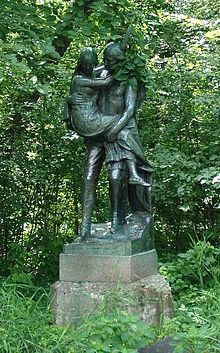
No machine-readable author provided. Emiel~commonswiki assumed (based on copyright claims). [Public domain]
Mr Wight showed us a slide of Jacob Fjelde’s sculpture of Hiawatha and Minnehaha (1912) and said that it was considered controversial at the time. He wondered if we knew why. Nobody answered his question. He then posed another question to the class. Look at the features of Hiawatha and Minnehaha, do they look like Native Americans? He noted that in the early part of the century the work had received a great deal of criticism because the figures looked too European. (I have since found out that this was because Fjelde could not find Native Americans to model for him so he had to work from photographs). He further told us that Longfellow had never visited the Minnehaha Falls which are situated in Minnehaha Park in the city of Minneapolis. Mr Wight also explained the meaning of the term The Noble Savage. It was a representation of the primitive as idealised and could be found often in Romantic Literature.
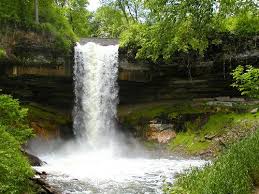 The Noble Savage symbolized the innate goodness of humanity when free from the corrupting influence of civilization. Hiawatha was Longfellow’s Noble Savage and this is one of the reasons why the poem was so successful when it was published in 1855.
The Noble Savage symbolized the innate goodness of humanity when free from the corrupting influence of civilization. Hiawatha was Longfellow’s Noble Savage and this is one of the reasons why the poem was so successful when it was published in 1855.
Michael Portillo’s excellent series Great American Railroad Journeys, which is currently being shown on BBC2, has touched on the subject of the Native Americans more than once during its run and Michael has actually visited Minneapolis. It is an interesting subject and if I am ever in Minneapolis I will be sure to visit Minnehaha Park and the Minnehaha Falls. I will have my copy of The Song of Hiawatha with me and I will take a short time out of my busy schedule to read some pages of the poem.
As I noted earlier, books of Longfellow’s poetry are quite easy to locate. The Arcade has copies from time to time and I am sure that if you hunt around, you will find a book of his poetry within days.
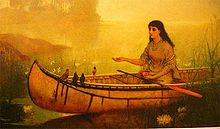 When I was educated as to the background of Longfellow’s epic poem it opened my eyes as to the suffering and exploitation of the Native Americans. This history is pretty evident today, but when I was at school it was just accepted. But I was lucky as I had an enlightened teacher who did not treat the studying of The Song of Hiawatha as some kind of punishment but as an opportunity to explore history as well as understanding the meaning of the poem. So when you next see a book of Longfellow’s poems just think of his background to the Hiawatha poem. It may raise an interest. If so, there are plenty of books on the market that deal with the Native American. I frequently come across these books when scouring second hand bookshops and occasionally they turn up in the Arcade.
When I was educated as to the background of Longfellow’s epic poem it opened my eyes as to the suffering and exploitation of the Native Americans. This history is pretty evident today, but when I was at school it was just accepted. But I was lucky as I had an enlightened teacher who did not treat the studying of The Song of Hiawatha as some kind of punishment but as an opportunity to explore history as well as understanding the meaning of the poem. So when you next see a book of Longfellow’s poems just think of his background to the Hiawatha poem. It may raise an interest. If so, there are plenty of books on the market that deal with the Native American. I frequently come across these books when scouring second hand bookshops and occasionally they turn up in the Arcade.
I have a favour to ask of you. If you are ever in Minneapolis and are visiting Minnehaha Park, please stop and give my regards to Hiawatha and Minnehaha.